- 8 Minutes to read
- Print
- DarkLight
- PDF
2.0.1 Modeling Release Notes, March
- 8 Minutes to read
- Print
- DarkLight
- PDF
Report Snapshot
The Snapshot option (shown below) allows you to take a snapshot of a report.
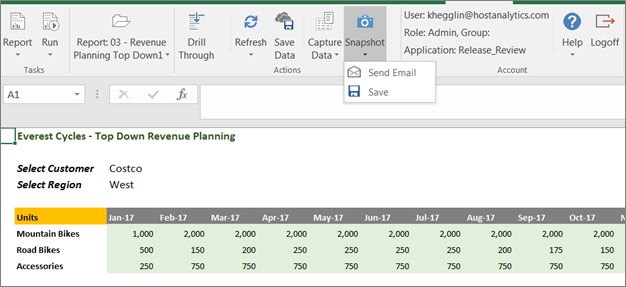
With this report Snapshot option, you can keep a snapshot of a report or share it with other users.
To take a Snapshot, access the Report task and the Run subtask. Click the Snapshot and select from two options.
1. Select Save to save the snapshot to the report folder structure.
2. Select Email to receive an email with a link to the snapshot, which you can share with other users of the application
Saving the Snapshot
When you select Save, the snapshot is automatically named after the report and appended with a date and time stamp. There is a dedicated folder, called Snapshot, in the folder structure where all snapshots are saved to. Snapshots in the Snapshot folder are stored alpha-numerically.
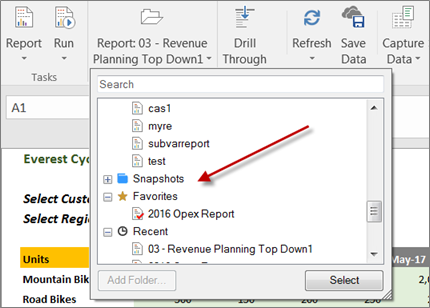
Snapshots are not backed up when you perform a model backup. So, when you restore a model you will not see the snapshots that are saved in the model. Snapshots can be viewed in SpotlightXL and Spotlight (the web front-end).
Providing Access to Saved Snapshots
Reviewer and Designer users must be given access to view a saved snapshot. To provide Reviewers and Designers with access:
Access the Manage task and the Group Management, Group Access subtask.
Select the Snapshot artifact.
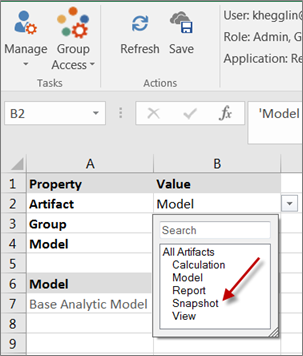
Select the Group that you want to provide access to the snapshots for the model you select in the Model field.
Once you select you will see the list of saved Snapshots along with the available groups and then you can provide access to each group by selecting/typing ‘Yes’. See screenshot below.
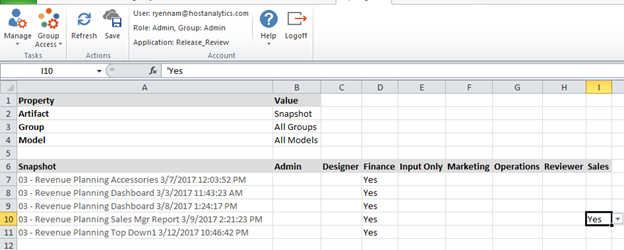
Admin users will have access to all saved snapshots.
Deleting Snapshots
Saved snapshots can be deleted from the snapshots folder by selecting the snapshot, right-clicking, and selecting Delete.
Audit Log for Snapshots
Every time a user saves, emails, or deletes a snapshot, an audit entry is created in the Audit Log as shown below. The Audit Log can be accessed by selecting the Manage task and the Application Administrator, Audit Log subtask.

Emailing a Snapshot
Once the link to the snapshot is emailed to the user, it will expire after 72 hours. Within that time frame, the same user can forward that email (containing the link) to other team members or management for collaboration and review. There is no group access security applied to emailed snapshot links, which is different when compared with saved snapshots. For Saved Snapshots, the admin user needs to provide group access so that Designer & Reviewer users can access the saved snapshots.
Users who want to access the Snapshot from the email need to be authenticated, So if the user is not logged into the Modeling application the system will ask the user to provide his login credentials and once the user is authenticated it will open the Snapshot.
If the user is already logged into the Modeling application then by clicking the snapshot link in the email will open the Snapshot.
Also, unlike the saved snapshots, emailed snapshots are not available in the Snapshots folder.
An example of an emailed snapshot link is provided below.
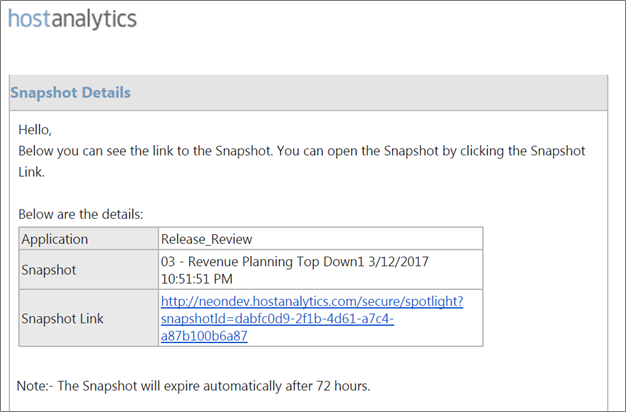
Enhancements to Report Design
With this release, there are additional options to the Design manager, which will be helpful when updating an existing report, finding specific report dimension members, and previewing members you might filter. These options are called:
Filter Member
To use Filter Member, open a report in design mode by selecting the Report task and the Design subtask.
Select the entire spreadsheet as shown below and click Design Manager.
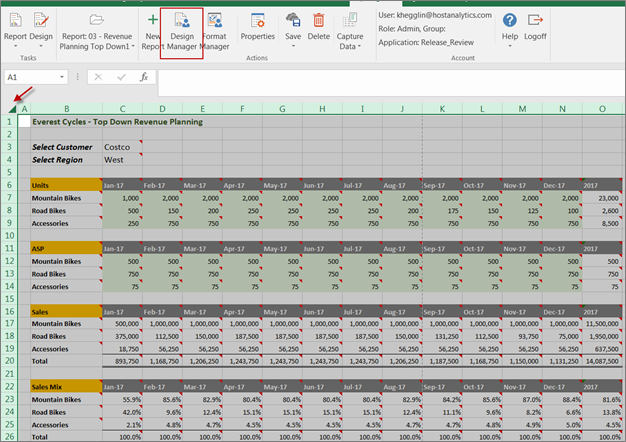
Select a dimension member to filter. In this case Jan 17 is selected (show below).
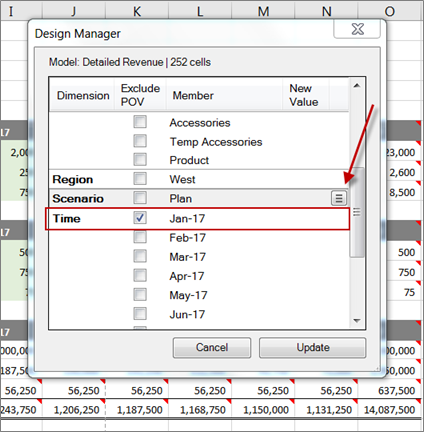
Now, select Filter Member as shown below.

The result is that the Jan 17 member filtered is selected in the design manager and is also highlighted within the spreadsheet as shown below.
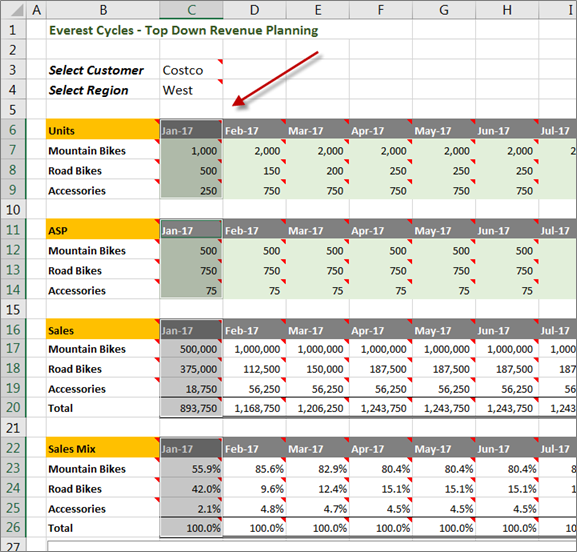
If you would like to make any changes to the report and you want to select only a specific member from the report design and then make the change, in this example Jan-17 this ‘Filter Member’ option will be very helpful.
Preview Filter Member
To use Preview Filter Member, open a report in design mode by selecting the Report task and the Design subtask. Select the entire spreadsheet and click Design Manager. Select a dimension member you want to preview prior to filtering. In this case, the Temp Mountain Bikes is selected along with the Preview Filter Member option as shown below.
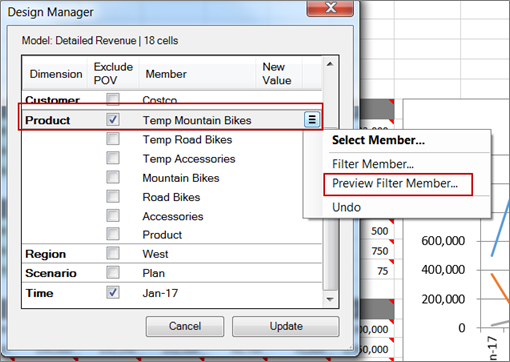
The result is that the cell range is displayed as shown below. This way you know exactly where the member exists within the report.
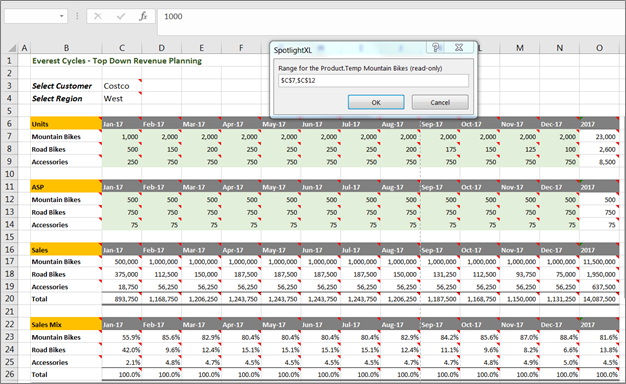
Data Download Updates
We’ve updated range logic behind the Data Download Calculation type, which is accessed by selecting the Model task and the Calculation subtask and then selecting the DownloadData type as shown below.
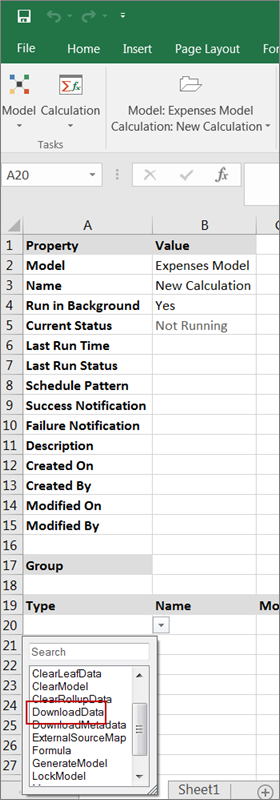
Previously, when you selected DownloadData and applied scope to Measure, Scenario, and Time dimensions, the application would locate the intersection of the range calculated from maps and defined in the scope. If the intersection was empty, an exception would result. If not empty, the intersection would become the new data download range for the dimensions.
For example, if the maps that have the source model as HACPM_Financial have references to Measure, Scenario, and Time dimensions. As an example, [2016, Actual, MTD] or [2015, 2016, Actual, Budget-FY16, MTD] then the data download range will be based on the references that are defined in the Map. If the Map has no references to these 3 dimensions, an exception would result
Now, if you apply scope to the data download range calculated from maps for Measures, Scenarios, and Time dimensions and scope contains the dimension, the range from Scope overrides the range associated with the map. For the dimension, this becomes the new data download range.
For example, you have defined a Scope on Time dimension with the year 2016 then the overall data download range will be just 2016. As the Scope range for data download will override the range defined in the Map.
See Also: How to Apply Scope to a Model
Example
Model Setup
Suppose, the HACPM_Financial model has the following dimensions:
Dimension
Account
Company
Department
Intercompany
Measures
Product
Project
Reporting
Scenario
Time
The Master model called DW_Test has the following three maps:
Master Map
Data Map 1
Data Map 2
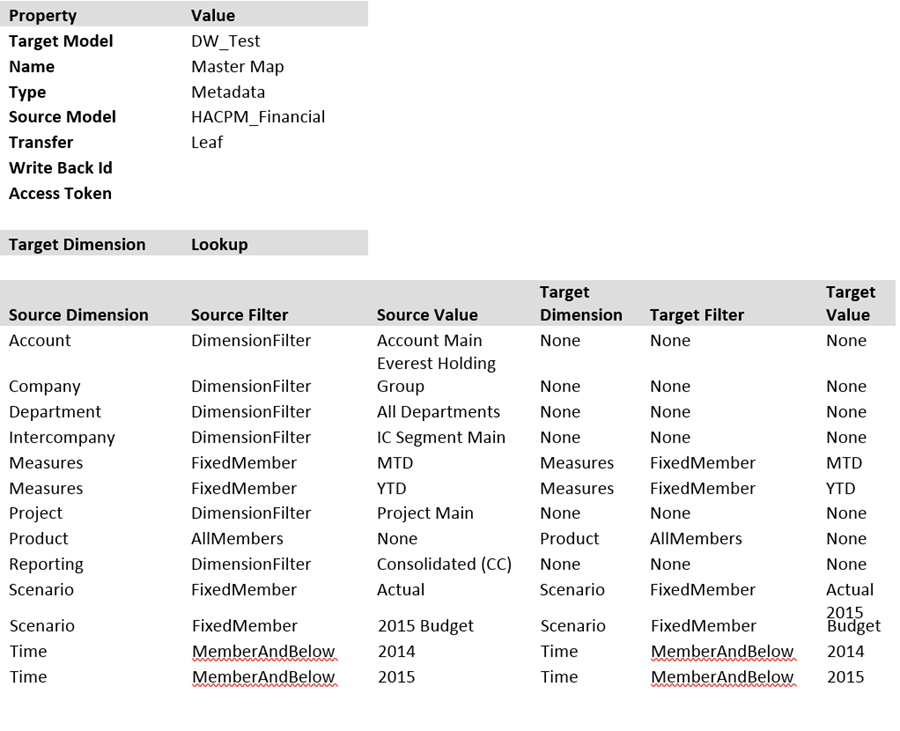
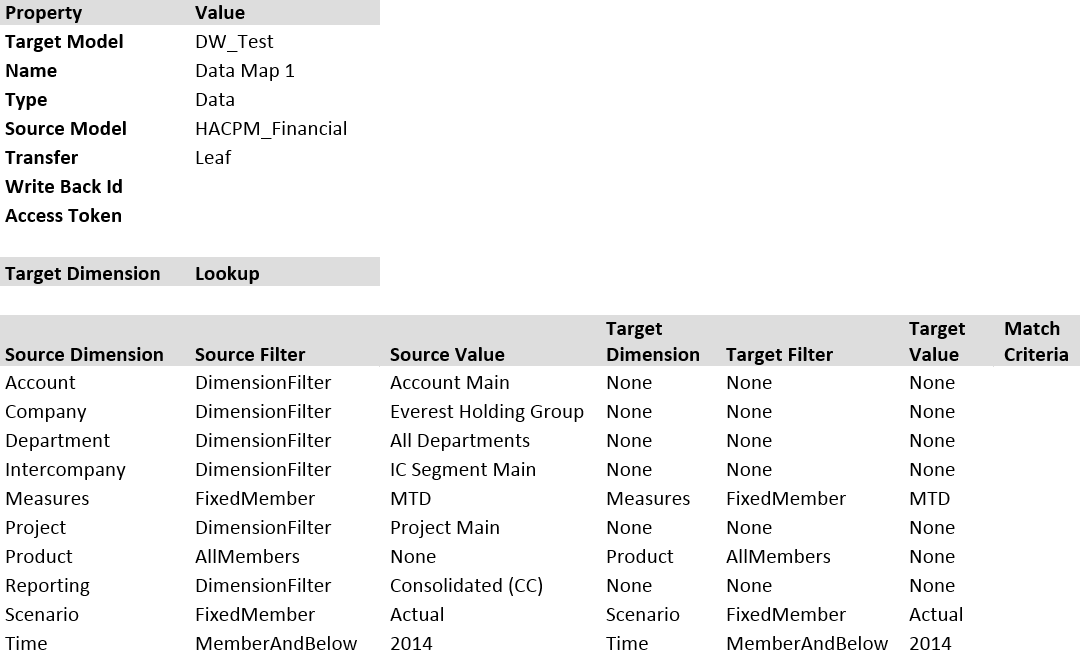
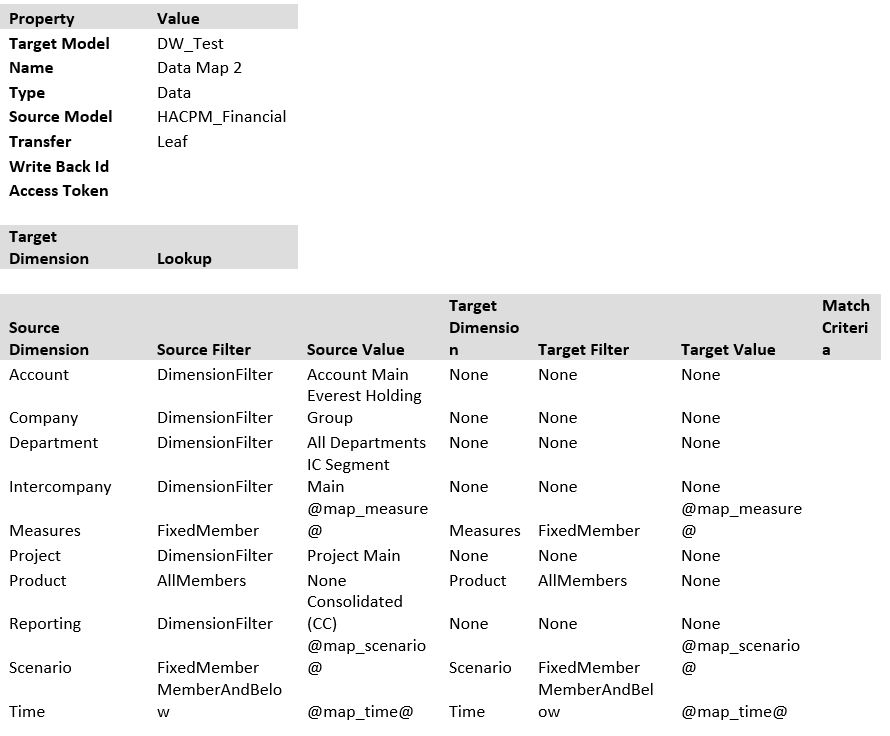
Then you create a scope called Download Data Scope as shown below.
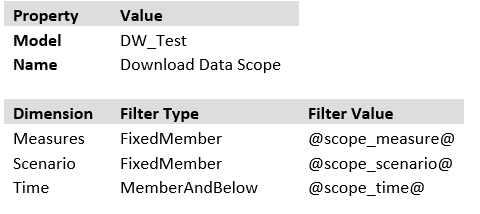
Finally, a Calculation is created to refresh the DW_Test model with the latest data.
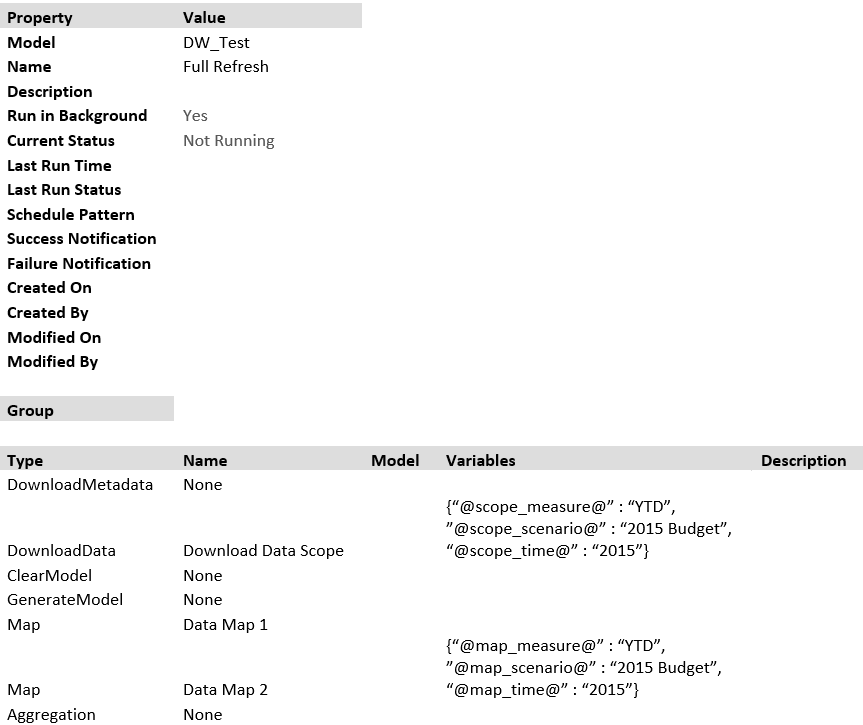
Current Behavior
Map Master Map will be ignored because it has type Metadata. Map Data Map 2 will be ignored because it has variables on all three dimensions – Measures, Scenario and Time. Map Data Map 1 yields the following ranges for dimensions:
Measures MTD
Scenario Actual
Time 2014
Scope ranges do not overlap with respective map ranges for all three dimensions. Exception will be thrown.
If you change type for Master Map from Metadata to Both, map ranges will be as follows:
Measures MTD, YTD
Scenario Actual, 2015 Budget
Time 2014, 2015
Now scope ranges overlap with map ranges, and data will be downloaded for the following combination:
Measures YTD
Scenario 2015 Budget
Time 2015
New Behavior
Map Master Map will be ignored because it has type Metadata. Map Data Map 2 will be ignored because it has variables on all three dimensions – Measures, Scenario, and Time. Map Data Map 1 yields the following ranges for dimensions:
Measures MTD
Scenario Actual
Time 2014
Scope range is as follows:
Measures YTD
Scenario 2015 Budget
Time 2015
Since scope ranges override respective map ranges, data will be downloaded for scope ranges.
If you change type for Master Map from Metadata to Both, result will not change.
Known Issues
2354 | Snapshot email link will not work for users with SSO integration if they are not logged into the application. As a workaround they should log into the application and then access the Snapshot email link. |
2309 | If users update the schedule for an existing Calculation then in some cases its being scheduled an hour later. If users need to update the schedule we recommend to clear the schedule pattern field and then save the calculation and then update the schedule. |
2276 | If user makes any changes to the report (ex:- formatting, adding rows or columns, deleting rows or columns) after running it and then take a Snapshot then user will not see all the changes made to the report and in some cases the snapshot will look weird. We recommend users to take Snapshots without making any changes to changes to the report after its executed |
2269 | "Please select Calculation Model" message persists upon saving a new report with Enable Save set to Calculation Model in Application Settings. |
2242 | Cell selection shows improper highlighted cells upon Preview Filter Member with freeze panes |
2203 | Shared POV status is lost upon changing value of POV in Design Manager / Report |
2113 | Integration between Planning & Modeling applications from web interface is best supported in Google Chrome browser. Users cannot navigate from Planning to Modeling if Internet Explorer compatibility mode is turned on. |
2080 | If users are using Firefox browser, right clicking an item in the Folder structure may display an incorrect menu. |
2017 | If users are using Firefox browser dimension hierarchy dropdown will only show up to 30 levels. |
1882 | Once the model that a variable refers to does not exist, the user is not able to delete or fix the invalid variable in the associated report. |
1845 | If POV member defined is removed or renames, it cannot be fixed in report design mode and error is displayed. |
1492 | Using special characters for the model name results in errors. |
1464 | When suppress rows/columns is enabled, If Dimension Members and Data Intersection are available in same column/row in a report then dimension members will be suppressed along with data intersections. |
1457 | In some cases Suppress blank rows/columns is not working as expected when Groups are expanded in the report. |
1455 | Suppress blank rows/columns is not supported in Spotlight (i.e. Web Interface). |
1454 | In Some cases Suppress blank rows / columns is not working as expected if groups and freeze panes are enabled in the Report. |
1446 | Unable to navigate to Design View after rename or remove HostAnalyze worksheet. |
1406 | Excel 2016 Chart Problems. |
1387 | Designer cannot generate external data source model. |
1322 | Unable to cascade with substitution variables. |
1321 | Substitution variables are not working as expected in Cascade Report. |
1273 | Cascade Report has inconsistencies with Filters. |
1144 | Freeze Panes location should not be outside of the sheet viewable range. |
687 | Modified Report definition by removing months column still retain after Refresh. |
405 | In Report Design, specify a dimension to be cascaded. Copy and paste the cascaded member/block in the same column. Select Save and Run and the following is displayed 'Cannot find variable '@Cascade' in model...'. Select Refresh and the following is displayed 'Object reference not set to an instance of an object'. |
Resolved Issues
2321 | Model becomes invalid if it was restored from a backup provided the Model name has spaces and it has reporting attributes |
2227 | Report/View cannot be opened from web if name contains ampersand ‘&’ |

